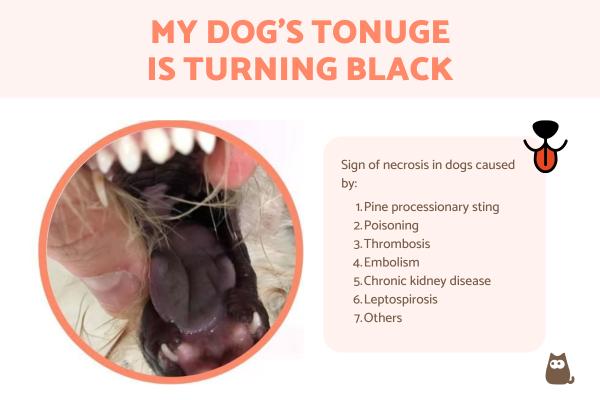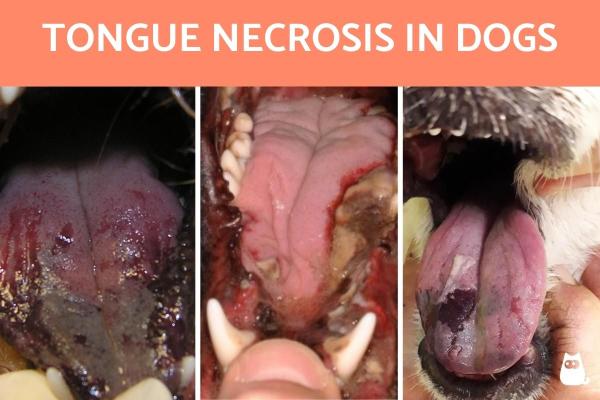My Dog's Tongue Is Turning Black



See files for Dogs
The tongue is an organ made up of various muscles which belongs to the digestive system. Different animal species will use their tongues in different ways and dog have their own specific uses. For example, the tongue not only allows them to intake water and food, it is an essential element in regulating body temperature. As well as the mucus membranes of the mouth, the tongue also helps us to establish their current state of health. For this reason, if we see discoloration of the tongue, especially if it is turning black, we need to take heed.
At AnimalWised, we look at the reasons why your dog's tongue is turning black. If this happens to your animal's tongue, you should know it is possibly due to tongue necrosis in dogs. We look at the causes and treatment of this serious canine health issue, as well as other possible reasons your dog's tongue changes color.
What is tongue necrosis in dogs?
Before we understand why a dog's tongue is turning black, we should take a look at this organ more closely. As part of the dog's digestive system, it is a mucosa-lined muscle which is divided into three main parts:
- The root: the deepest part of the tongue. It is attached to the oral cavity at the beginning of the pharynx.
- The body: forms the longest part of the tongue. Although it is mobile, it is held in place by the frenulum. Dogs are characterized by having a very marked groove in the center of the body of the tongue.
- The apex: the tip of the tongue.
A dog's tongue has multiple functions. They include, but are not limited to:
- Water intake and food handling.
- The perception of flavor, texture, temperature, etc.
- Grooming by licking.
- Panting is essential in dogs since they lack sweat glands in their dermis. Panting is an alternative mechanism to sweating to reduce body temperature when it rises.
Now the structure and functions of the tongue have been explained, we can proceed to explain what is canine tongue necrosis. Tongue necrosis us a type of cell death. Living tissue cells of the tongue die as a result of aggression, making it a traumatic form of cell death. This is opposed to apoptosis, i.e. healthy programed cell death. The agents capable of producing tissue necrosis can be classified into 5 types:
- Ischemia or anoxia: occurs as a result of the decrease or absence of oxygen supply to the cells, due to a failure in the blood supply.
- Poisoning: due to toxic or chemical agents.
- Physical agents: such as trauma, cold, heat, or even electrical energy (electrocution).
- Biological agents: such as bacteria, viruses or protozoa, as well as the toxins they produce.
- Immunological mechanisms: includes diseases which cause immunodeficiency.
When necrosis occurs, the healthy cells die. Necrosis can happen to internal tissues and cause discoloration. For example, when cells in a dog's lung undergo necrosis, they can turn black. Although they may causes systemic symptoms, we don't usually see the change in tissue color. However, when necrosis occurs on a dog's tongue, we can see it change black in the areas where necrosis has occurred.

Causes of tongue necrosis in dogs
We have explained the general reasons why a dog's tongue is turning black due to necrosis, but there are some specific causes we need to look out for. Here we provide some of the most common:
- Processionary caterpillar: each processionary caterpillar has thousands of stinging hairs, like fine needles. These hairs deliver a powerful toxin known as thaumetopein. When this toxin comes into contact with mucous membranes, including the tongue, it causes tissue necrosis and the tongue to turn black.
- Other toxicological causes: although the processionary caterpillar is the toxicological cause which can be most arresting, there are other toxins capable of producing tongue necrosis, such as industrial acids or even household caustics.
- Thrombosis or thromboembolism: when a clot obstructs the lingual circulation, an area of necrosis is produced due to the lack of blood supply in the area (ischemia).
- Chronic Kidney Disease (CKD): as CKD progresses, there is an increase in the levels of urea in the blood (uremia). Bacteria present in saliva convert excess urea to ammonia, which produces uremic stomatitis with ulcers and areas of necrosis on the tongue and other structures of the oral cavity.
- Leptospirosis: is an infectious disease caused by bacteria of the genus Leptospira. In these cases, tongue necrosis can occur as a result of two factors, specifically thrombosis and/or vasculitis.
Learn about how to treat one of the causes of tongue necrosis with our article on first aid for processionary caterpillar intoxication.
Symptoms of tongue necrosis in dogs
As the title of this article suggests, the most noticeable symptom of tongue necrosis in dogs is discoloration of the organ itself. It will not necessarily look black immediately, initially turning cyanotic, i.e. a bluish/purplish color. There will be a red lining around the necrotic areas. As time progresses, the tongue coloration will darken and start to look black as the tissue loss occurs.
In addition to discoloration, the symptoms of tongue necrosis in dogs include:
- Pain in the oral cavity
- Anorexia causes a loss of appetite as a consequence of pain in the oral cavity. Learn more about canine weight loss with our article on why a dog is losing weight.
- Dysphagia (difficulty swallowing)
- Sialorrhea (drooling), caused by inability to keep saliva in the mouth

Diagnosis of tongue necrosis in dogs
You may suspect tongue necrosis if the dog's tongue has started to change color, especially if it has turned black. To confirm the diagnosis of tongue necrosis in dogs, it is required to not only identify the lesion at the lingual level, but also determine the cause that produced it. To do this, the veterinary team that treats the dog must follow the following steps:
- Anamnesis and clinical history: in these cases, it is essential to carry out a complete anamnesis, with questions directed towards the possible ingestion or contact with toxic products.
- Physical examination: as we have explained, tongue necrosis will manifest itself with a change in the color of the tongue (purple, greenish or blackish tones, depending on the phase) and with the loss of tissue.
- Complementary tests: it may be necessary to carry out laboratory tests, such as blood and urine tests, microbiological diagnoses, etc. to identify the cause of necrosis.
Learn more about some possible diagnostic tools with our article on how to understand a dog's blood test.

Treatment of tongue necrosis in dogs
The treatment of tongue necrosis can vary depending on the severity of the process and the underlying cause. In general, the therapeutic approach to this alteration may include the following:
- Support treatment: aims to treat the pain and discomfort associated with this process, until healing occurs. Among other medications, pain relievers or sedatives can be administered, even helping the healing of the tongue using laser therapy.
- Specific treatment: once the cause of the tongue necrosis has been identified, it is essential to establish a specific therapy against it. Otherwise, the necrosis process could continue advancing. For example, in the case of chronic kidney disease in dogs, it will be necessary to establish medical treatment (hypotensive agents, fluid therapy, etc.) and diet. In the case of vasculitis, treatment with corticosteroids will be necessary to prevent vascular damage from progressing further. In case of leptospirosis, antibiotic treatment will be required.
- Surgical treatment: in severe cases, surgical intervention may be necessary to remove the necrotic tissue.
Prognosis of Tongue Necrosis in Dogs
The prognosis of canine tongue necrosis is reserved. The precocity both in the diagnosis and in the establishment of the treatment will determine the severity of the process.
For this reason, whenever you detect any alteration in your dog's tongue or you suspect they had contact with any toxin (including processionary caterpillars), do not hesitate to go immediately to a trusted veterinarian. If early treatment is instituted, the process will be resolved without complications. The only sequela will be the loss of a small part of lingual tissue.
However, if action is not taken promptly, the necrosis can progress to the point where practically the entire tongue is affected. Although surgery may be able to help in some cases, it often has a fatal outcome as the dog will be unable to live in such a condition.
Prevention of canine tongue necrosis
To avoid the appearance of tongue necrosis in dogs, all those factors that can cause it must be prevented. For it:
- Avoid taking walks through pine forest areas, especially in the spring months. This helps to avoid any accidental exposure to the processionary caterpillar.
- Keep any chemical and toxic product out of the reach of your pets.
- Comply with the vaccination schedule prescribed by your veterinarian. In this case, the prevention of leptospirosis in dogs will be especially important.
- Comply with your dog's regular veterinary check-ups. Through these check-ups, pathologies such as chronic kidney disease can be detected in its early stages. The kidney disease can be managed in such a way it avoids the appearance of complications such as tongue necrosis.
Other reasons a dog's tongue is turning black
Before we even suspect a condition like tongue necrosis, it is important we verify discoloration has actually taken place. Some dog breeds have a naturally dark tongue which looks blue, purple or even black. This breeds have a genetic inheritance which provides this coloration and it is not something we need to worry about. Dog breeds with naturally bue tongues include the Chow Chow and Shar Pei, but we must remember mixes from these breeds may inherit this tongue color.
Another reason a dog's tongue may change color is due to dryness. Some dogs have been breed in such a way they have a tongue which is difficult to remain in their mouths. Brachycephalic dog breeds have a shortened soft palate which often results in this phenomenon, but some toy breeds such as the Yorkshire Terrier also have tongues which hang out.
Since the tongue is exposed to the air and is not always hydrated by saliva, it can dry out. This can lead to discoloration, often seen with a black line appearing at the side of the tongue. The problem may be limited to discoloration, but regular veterinary checkups will be required to ensure the health of the tongue.
Other causes of a dog's tongue turning black include certain tumors (although only once they have progressed significantly), canine periodontal disease (where gum inflammation affects the tongue) and even dietary deficiencies (not enough iron in the diet may lead to the tongue turning black).

My dog's tongue is turning purple
Instead of turning black, it is possible you observe your dog's tongue is turning purple or even blue. As we have stated above, it is possible your dog's genetics have naturally given them blueish or purplish mucus membranes, giving the appearance of their tongue a different color than is common in dogs. However, this is not the same as a dog's tongue turning blue or purple.
Unlike turning black, a dog's tongue going purple is not necessarily necrosis. However, it could be the early stages of this problem. When necrosis is not involved, a blue tongue in dogs is most likely a sign of cyanosis. Cyanosis in dogs is a symptom evident when body tissue (in this case, the dog's tongue) loses its normal supply of oxygen. The hemoglobin in the blood binds to deoxygenated red blood cells, causing the purplish/blue color.
The reasons for cyanosis in dogs which cause their tongue to go purple include the following:
- Respiratory disease: the reduction in breathing capacity means less oxygen is circulated.
- Circulatory disease: produces a similar inability to transport oxygen.
- Heart disease: if the heart cannot pump blood properly, it can result in poor blood oxygenation.
- Blood clots: blockages caused by clots prevent oxygen transport.
- Toxins: as with necrosis, poisoning can also cause tongue discoloration in this way.
Treatment will depend on the cause, but many are chronic issues. All will need veterinary treatment.
This article is purely informative. AnimalWised does not have the authority to prescribe any veterinary treatment or create a diagnosis. We invite you to take your pet to the veterinarian if they are suffering from any condition or pain.
If you want to read similar articles to My Dog's Tongue Is Turning Black, we recommend you visit our Other health problems category.
- Bruchim, Y., Ranen, E., Saragusty, J., & Aroch, I. (2005). Severe tongue necrosis associated with pine processionary moth (Thaumetopoea wilkinsoni) ingestion in three dogs. Toxicon, 45(4), 443-447.
- Koscinczuk, P., Hull, J. J.; Cainzo, R. P., & Camoletto, D.A. (2021). Resolution of tongue necrosis due to canine leptospirosis. Veterinary Magazine, 32(1), 114-116.






 My dog has lost a lot of weight won't eat his touge is turning black on the end
My dog has lost a lot of weight won't eat his touge is turning black on the end




